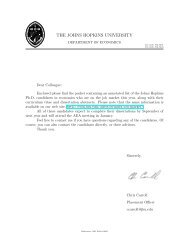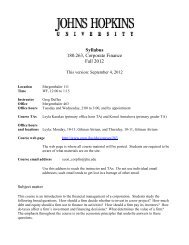WEALTH, DISPOSABLE INCOME AND CONSUMPTION - Economics
WEALTH, DISPOSABLE INCOME AND CONSUMPTION - Economics
WEALTH, DISPOSABLE INCOME AND CONSUMPTION - Economics
You also want an ePaper? Increase the reach of your titles
YUMPU automatically turns print PDFs into web optimized ePapers that Google loves.
4 CONCLUSION<br />
The wealth measure developed in this study has significant explanatory<br />
power for consumption over and above the information already contained<br />
in current disposable income. This suggests that expected future income is<br />
an important determinant of consumption for at least some households. At<br />
the same time, disposable income remains an important determinant of<br />
consumption in both the short and the long run. One interpretation of this<br />
finding is that a significant proportion of households are liquidity constrained<br />
and therefore consume out of disposable income. An alternative<br />
interpretation is that wealth is measured with error, and this error is correlated<br />
with disposable income. Unfortunately, the results presented in this<br />
study cannot be used to discriminate between these two alternatives.<br />
A second finding is that fluctuations in equity prices have no significant<br />
impact on aggregate consumption of non-durables and services. A<br />
measure of non-human wealth that includes equity is found to have little<br />
explanatory power for consumption in either the long or the short run,<br />
while a measure that excludes equity is a significant long-run determinant<br />
of consumption. This finding may reflect the fact that most consumers simply<br />
do not hold equity or that a large proportion of the changes in equity<br />
prices are viewed as transitory.<br />
Estimates of dynamic EC consumption functions suggest that the<br />
negative effect of interest rates on consumption in a traditional Keynesian<br />
consumption function is due principally to the effect of interest rates on<br />
human wealth. When wealth is included among the regressors, the coefficient<br />
on the real interest rate remains negative, owing presumably to an<br />
intertemporal substitution effect, but this effect is not significant.<br />
For policy makers and practitioners, the most convincing evidence<br />
that wealth is an important determinant of consumption is probably that it<br />
is helpful in explaining both the severity of the 1981–82 recession and<br />
consumption boom of the late 1980s, both of which appear anomalous<br />
based on a traditional EC consumption equation that does not include<br />
wealth. While future work will no doubt improve empirical consumption<br />
47




